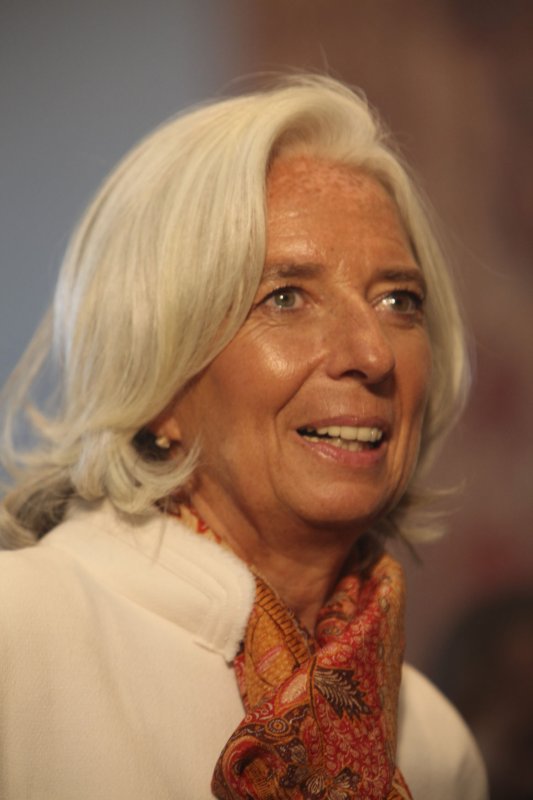IMF Chief Christine LaGarde looks on during the Delegates Luncheon at the United Nations in New York on September 24, 2013. UPI/Allan Tannenbaum/Pool |
License Photo
WASHINGTON, Jan. 15 (UPI) -- The International Monetary Fund's Christine Lagarde said in Washington Wednesday she's hopeful the past seven tough years will give way to seven strong ones.
Speaking at the National Press Club in Washington, Lagarde, the IMF's managing director, said while the economic "crisis still lingers," "optimism is in the air."
"My great hope is that 2014 will prove momentous in another way -- the year in which the 'seven weak years,' economically speaking, slide into 'seven strong years,'" she said.
"Is this wishful thinking? No, but it will not simply happen on its own. Getting beyond the crisis still requires a sustained and substantial policy effort, coordination and the right policy mix."
Lagarde said updated forecasts that are still being finalized indicate the global economic momentum that gathered in the second half of 2013 should strengthen further this year on the shoulders of the world's advanced economies.
However, she said, deflation poses a significant risk that "could prove disastrous for the recovery."
"If inflation is the genie, then deflation is the ogre that must be fought decisively," she said.
Another concern is that emerging markets that helped spur global growth the past several years are showing signs of slowing down.
"Overall, the direction is positive, but global growth is still too low, too fragile and too uneven," she said. "Moreover, it is not enough to create the jobs for the more than 200 million people around the world who need them.
"In far too many countries, the benefits of growth are being enjoyed by far too few people. Just to give one example: In the United States, 95 percent of income gains since 2009 went to the top 1 percent. This is not a recipe for stability and sustainability."
She recommends central banks in the advanced economies "return to more conventional monetary policies only when robust growth is firmly rooted."
"At the same time, countries need to use the room created by unconventional monetary policies to put in place the reforms needed to jump-start growth and jobs," she said.
In the United States, she said, it will be "critical to avoid premature withdrawal of monetary support and to return to an orderly budget process, including by promptly removing the debt ceiling threat."
In Europe, where the recovery has been uneven, "monetary policy is helping a lot, but could still do more," she said, recommending targeted lending to help reduce "financial fragmentation."
Japan, she said, faces the challenge of reaching agreement on "medium-term fiscal adjustments and social and economic reforms needed to strengthen growth."
In emerging markets, "policymakers must be wary of any signs of financial excess, especially in the form of asset bubbles or rising debt," she said. "Financial regulation needs to be strengthened and implemented in order to better manage credit cycles. And yes, many countries also could do more on the structural front to unlock their growth potential, including by tackling infrastructure bottlenecks or regulatory obstacles."
Lagarde said the news is "generally good" in low-income countries.
"Now is the time to lock in these gains and build stronger defenses against either direct or consequential external shocks, including by raising more revenue," she said. "In addition, countries should keep spending selectively on important social programs and infrastructure projects."
The Arab Spring countries need the "firm support of the international community" as they "grapple with the reforms needed to unleash the dynamism of the private sector and create more jobs for their young people."
Lagarde said Asia and sub-Saharan Africa, with their rising economic power and middle class, give her "renewed optimism."










